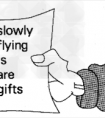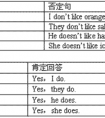判断句子对(√)错(×)。( )1. How is you?( )2. Thanks you.( )3. Here is your ticket.( )4. Show me you blue crayon.( )5. Very well.-三年级英语
第一人称
第二人称
第三人称
形容词性物主代词
my
your
his
her
its
our
your
their
名词性物主代词
mine
yours
his
her
its
ours
yours
theirs
汉语意思
我的
你的
他的
她的
它的
我们的
你们的
他(她它)们的
This is her dress. / This dress is hers.
物主代词的用法:
物主代词既有表示所属的作用又有指代作用,例如:
John had cut his finger; apparently there was a broken glass on his desk.
约翰割破了手指,显而易见,他桌子上有个破碎的玻璃杯。
物主代词有形容词性(my, your等)和名词性(mine, yours等)两种,形容词性的物主代词属于限定词。
名词性的物主代词在用法上相当于省略了中心名词的 --'s属格结构,例如:
Jack's cap 意为 The cap is Jack's.
His cap 意为 The cap is his.
名词性物主代词的句法功能:
a. 作主语,例如:
May I use your pen? Yours works better.
我可以用一用你的钢笔吗? 你的比我的好用。
b.作宾语,例如:
I love my motherland as much as you love yours.
我爱我的祖国就像你爱你的祖国一样深。
c.作介词宾语,例如:
You should interpret what I said in my sense of the word, not in yours.
你应当按我所用的词义去解释我说的话,而不能按你自己的意义去解释。
d.作主语补语,例如:
The life I have is yours. It's yours. It's yours. 我的生命属于你,属于你,属于你。
物主代词的意思是物品主人的代词。
| 人称代词 | 第一人称单数 | 第二人称单数 | 第三人称单数 | 第一人称复数 | 第二人称复数 | 第三人称复数 |
| 主格 | I | you | he/she/it | we | you | they |
| 宾格 | me | you | him/her/it | us | you | them |
| 汉语 | 我 | 你 | 他 | 我们 | 你们 |
他/她/它们 |
| 形容词性物主代词 | my | your | his/her/its | our | your | their |
| 名词性物主代词 | mine | yours | his/hers/its | ous | yours | theirs |
| 汉语 | 我的 | 你的 | 他的/她的/它的 | 我们的 | 你们的 | 他/她/它们的 |
考点名称:副词
- 副词:
用来修饰动词、形容词、其他副词或全句的词,表示时间、地点、程度、方式等。 - 分 类:
1) 时间和频度副词:
now,then,often,always,usually,early,today, lately, next,last,already,generally,frequently, seldom,ever,never,yet,soon,too, immediately, hardly,finally,shortly, before, ago,sometimes, yesterday.
2) 地点副词:
here, there, everywhere, anywhere, in, out, inside, outside, above, below, down, back, forward, home, upstairs, downstairs, across, along, round , around, near, off, past, up, away, on.
3) 方式副词:
carefully, properly, anxiously, suddenly, normally, fast, well, calmly, politely, proudly, softly, warmly
4) 程度副词:
much,little, very,rather,so,too,still, quite, perfectly, enough, extremely, entirely,almost, slightly.
5) 疑问副词:
how, when, where, why.
6) 关系副词:
when, where, why.
7) 连接副词:
how, when, where, why, whether. 副词的位置:
A、副词修饰动词(包括动名词和分词)时,通常位于被修饰动词的后面。
例:Shestudieshard.她学习努力。
B、副词修饰形容词是,通常放在该形容词的前面。
例:LiMingistooyoung.Hecan’tcarrytheheavybox. 李明太小,他搬不动这个重箱子。
C、副词修饰其他副词时,通常放在被修饰副词的前面。
例:Thegirlsingsverywell.这个女孩歌唱得非常好。副词用法:
副词在句中可作状语,表语,补语。
He works hard.
他工作努力。
You speak English quite well.
你英语讲的很好。
Is she in ?
她在家吗?
Let's be out.
让我们出去吧。
Food here is hard to get.
这儿很难弄到食物。
考点名称:实义动词
实义动词:
与系动词是相对的,系动词亦称连系动词,作为系动词,它本身有词义,但不能单独用作谓语,后边必须跟表语(亦称补语),构成系表结构说明主语的状况、性质、特征等情况。
实义动词意思完全,能独立用作谓语。
实义动词有及物动词和不及物动词(及物动词是指后面要求有直接宾语的动词;
不及物动词指后面不需要跟宾语的动词)即行为动词,表示动作的动词。
实义动词(又称行为动词):表示行为或状态,有完全的词义,能独立作谓语。
如:I go to school by bus. 我乘公交车去上学。
The students clean their classroom every day. 学生每天打扫教室。- 及物动词:
后面必须跟宾语,意义才完整的实义动词,叫做及物动词(transitive verb)。
英语中的及物动词有:interest,worry,guss,please,surprise,love等
例如:I believe that the committee will consider our suggestion.我相信委员会将会考虑我们的建议。
“How long can I keep the book ”Harry asked.哈里问:“这本书我可以借多久?”
Dr. Bethune set us a good example. 白求恩大夫给我们树立了好榜样。
Crude oil contains many useful substances.原油含有许多有用的物质。
不及物动词:
本身意义完整,后面不用跟宾语的实义动词,叫做不及物动词(intransitive verb)。
Birds fly.鸟会飞。
It happened in June 1932.这件事发生于一九三二年六月。
My watch stopped.我的表停了。
She spoke at the meeting yesterday evening. 她在昨天晚上的会上发了言。
兼作及物动词和不及物动词:
英语里有不少实义动词可以兼作及物动词和不及物动词。
这样的动词又有两种不同的情况:
a)兼作及物动词和不及物动词时,意义不变。试比较:
Shall I begin at once?我可以立刻开始吗?(begin作不及物动词)
She began working as a librarian after she left school.她毕业后当图书馆管理员。(began作及物动词)
When did they leave Chicago?他们是什么时候离开芝加哥的?(leave 作及物动词)
They left last week. 他们是上周离开的。(left 作不及物动词)
b)兼作及物动词和不及物动词时,有时意义不尽相同。如:
Wash your hands before meals.饭前要洗手。
Does this cloth wash well? 这布经得起洗吗?
与汉语的比较:
有时英语动词的及物和不及物的用法,与汉语的用法完全不一样,请注意下列两种情况:
- 最新内容
- 相关内容
- 网友推荐
- 图文推荐
| [家长教育] 孩子为什么会和父母感情疏离? (2019-07-14) |
| [教师分享] 给远方姐姐的一封信 (2018-11-07) |
| [教师分享] 伸缩门 (2018-11-07) |
| [教师分享] 回家乡 (2018-11-07) |
| [教师分享] 是风味也是人间 (2018-11-07) |
| [教师分享] 一句格言的启示 (2018-11-07) |
| [教师分享] 无规矩不成方圆 (2018-11-07) |
| [教师分享] 第十届全国教育名家论坛有感(二) (2018-11-07) |
| [教师分享] 贪玩的小狗 (2018-11-07) |
| [教师分享] 未命名文章 (2018-11-07) |






